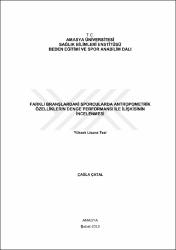Farklı branşlardaki sporcularda antropometrik özelliklerin denge performansı ile ilişkisinin incelenmesi
Özet
Bu çalışmanın amacı, farklı oyun yapısına sahip sporcuların antropometrik özelliklerinin, denge performansı ile ilişkisinin incelenmesidir. Çalışmaya düzenli olarak futbol (n=25), voleybol (n=25) ve judo (n=25) sporu yapan toplam 75 kişi katılmıştır. Antropometrik özelliklerin belirlenmesine yönelik, antropometrik set kullanılarak bacak boyu, oturma yüksekliği, uyluk uzunluğu, ayak boyu, ayak bileği genişliği, omuz-dirsek uzunluğu, önkol uzunluğu, omuz genişliği, omuz çevresi, uyluk çevresi, bel çevresi ve kalça çevresi olmak üzere toplam 12 bölgeden ölçüm alınmıştır. Çevre ölçümleri vücudun veya parçalarının uzun eksenine dik açılar alınarak gerçekleştirilmiştir. Çalışma sonucunda; futbol, voleybol ve judocuların antropometrik özellikleri incelendiğinde gruplar arasında anlamlı farklılık olduğu tespit edilmiştir. Voleybolcuların oturma yüksekliği judoculardan anlamlı düzeyde farklıdır (p<0.05). Futbolcularda boy ile dominant bacak sağ ayak gözler açık kullanılan alan değerleri arasında pozitif ilişkinin olduğu ortaya çıkmıştır (p<0.05). Judocuların omuz genişliği değerleri diğer branşlara göre daha anlamlı farklılık göstermektedir. Uyluk çevresi değerleri incelendiğinde futbolcular voleybolculardan anlamlı düzeyde yüksek çıkmıştır (p<0.05). Bel çevresi ve kalça çevresi değerlerinde voleybolcular judo ve futbolculardan daha düşük değerlere sahip oldukları tespit edilmiştir (p<0.05). Futbolcuların statik denge performansı ile ayak boyu ile çift ayak gözler açık kullanılan alan ve çift ayak gözler açık kullanılan çevre değerleri arasında pozitif ilişki vardır (p<0.05). Futbolcuların omuz çevresi ile dominant olmayan bacak gözler kapalı kullanılan alan değeri arasında pozitif ilişki vardır (,619**). Judocuların dinamik denge performansı ile oturma yüksekliği ve uyluk uzunluğu arasında yüksek düzeyde ilişki olduğu görülmüştür (p<0.05). Çift ayak gözler açık ve kapalı statik ve dinamik dengenin çevre değerlerinde futbolcular hem judo hem de voleybolculardan anlamlı düzeyde daha yüksek değerlere sahip olduğu ortaya çıkmıştır (p<0.05). Futbolcuların vücut yağ yüzde değeri ile dominant olmayan bacak gözler kapalı kullanılan alan değeri arasında pozitif ilişki vardır (,414*). Voleybolcu ve judocuların vücut yağ yüzde değeri ile yağsız vücut kütlesi değerinde anlamlı farklılık yoktur (p>0.05). Araştırma sonucunda, sporcular arasında branş bazında antropometrik temel farklılıkların bulunduğu bu farklılıkların da denge performansına etki ettiği söylenebilir. The aim of this study is to examine the relation between the anthropometric speciality and balance performance of the sporters who have different play structure. This study includes the sporters who play football (n=25), volleyball (n=25) and judo (n=25) regularly. In order to specify the anthropometric speciality, measurement was taken from totally 12 sections like the length of legs, the height of sitting, the length of femur, the size of foot, the width of ankle, thelength of shoulder and elbow, the length of fore arm, the width of shoulder, the circles of shoulder, the circles of femur, the circles of waist and the circles of hip. The circles measurement was taken by the right angle to the parts of the body or the length. When the results are examined, it is found that the sitting length of the volleyball players are meaningfully different from the judoist (p<0,05). It is found that there is a pozitive relation between footballer's height and dominant leg right foot opened eye area measurement. The measuring of the shoulder width of judoist is meaningjully different from the other branches. The measuring of the femur circle of volleyball players is meaningjully less than footballers (p<0,05). When the circumference of the thighs were examined, the players were significantly higher than the volleyball players (p<0.05). It is found that volleyball players have less waist width and hip circle measurements than judoist and footballers. There is a positive relationship between footballers static balance performance and foot size and double feet spened eyed area and double feet opened eyed area measurements. It is found that there is a high relationship between judoists dynamic balance performance and sitting heipght and femur length. There is a positive relationship between the shoulder circumference of the players and the non-dominant leg eyes closed area value (619 **). It is foundthat footballers have high values than both judoist and volleyball players in terms of double feet opened eye and closed static and dynamic balance area measurements. There is a positive correlation between body fat percentage value of football players and non-dominant leg eyes closed area value (, 414 *). There was no significant difference in body fat percentage of volleyball players and judo judges with lean body mass (p>0.05). At the end of the study it can be said that there is a basic anthropometric difference between sporters and these differences affect the balance performance.
Bağlantı
https://tez.yok.gov.tr/UlusalTezMerkezi/TezGoster?key=T1mWGp9MngYYkCSgiJvtVtyKikaFgjk-qJhU8QSYgbbMQlo6DpXB5ukqvC2EOAiphttps://hdl.handle.net/20.500.12450/1939
Koleksiyonlar
- Tez Koleksiyonu [103]


















